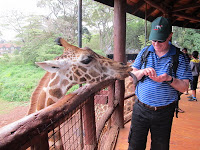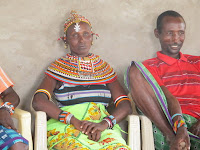This time the plane we were travelling back to Nairobi on was quite small - 5 passengers and the pilot. Weight was a critical issue, so the pilot had an amazing job to do. First of all he filled the plane with fuel, then weighed all our luggage, asked us all our weight (I chose to be very honest rather than my usual cutting off a pound or two!), then began to figure out how to distribute everything so that the back end of the plane was not too heavy. That took us until 1:00 to get sorted out!
The luggage mostly fit in that storage space beneath the plane, except for one suitcase that wouldn't fit - that belonged to the one man on the flight! I ended up sitting in the very back of the plane. Jenaya had my camera because I couldn't hold anything on my lap - no extra weight allowed - so these are the pictures she took - beginning with her self-portrait! We were very, very happy to be finally on our way....
These are a couple of shots of the Marsabit mountain - it was quite incredible to see how very green it is. It hasn't looked like this in 10 years is what we were told. So I am glad Jenaya felt free to use my camera to capture it!
It was, of course, quite wonderful to arrive in Nairobi and find Arthur here with Tim (who was quite glad to see us arrive with his suitcase of clean clothes!). Today Art and I had a chance to play tourist, and gave Tim a break from being our tour guide. The first place we went was to the elephant orphanage. We saw 18 of the orphaned elephants - we arrived to see them get their 11:00 a.m. feeding. These animals have all been orphaned for different reasons - sometimes their mothers have been poached for their tusks, sometimes the mothers have died of other means. But a baby elephant needs its mothers milk for a minimum of two years - without that milk, they will very quickly die. So this organization called the David Sheldrick wildlife trust has created a haven for these baby elephants. I now have many, many pictures of elephants - and of Arthur!
A baby elephant needs to be fed milk for a minimum of 2 1/2 to 3 years. Then what this organization does is try to re-introduce them into the wild. A trainer will walk with the elephant out into the forest early in the morning and return with it around supper time. Out in the forest this elephant will begin to interact with the other elephants who live in the wild - eventually one of the groups of elephants will accept this new elephant into their group. But this process of introducing the orphaned elephant to the a new group could take up to five years. The trainers might be working with one particular elephant for up to 8 years - it was quite touching watching their interaction with the elephants - clearly they developed personal attachments!
The other place that we went was to the Kenyan Giraffe Centre. Not as many interesting facts, but some great pictures!Tomorrow afternoon we will be heading to Longido, Tanzania, to find out more about the work that Sauti Moja Tanzania does. I have been told that although we will be staying in a very nice guest house there, that we will not have internet. So my assumption is that it will be a few days before I can post anything again - I may be silent for a bit, but I will be back! Today I am well aware that it is the first Sunday in Advent - I can't even begin to tell you how far away I feel from Christmas right now!




















































